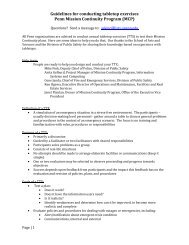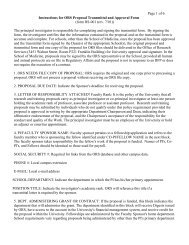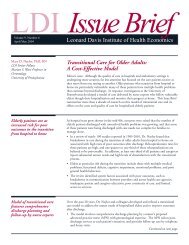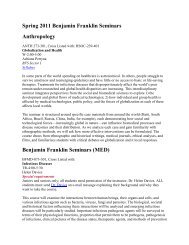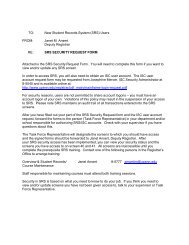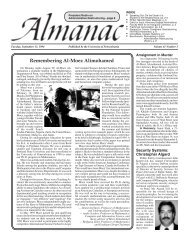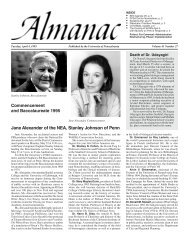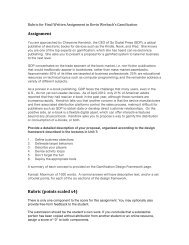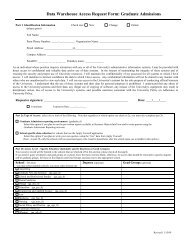2009-2010 COURSE REGISTER - University of Pennsylvania
2009-2010 COURSE REGISTER - University of Pennsylvania
2009-2010 COURSE REGISTER - University of Pennsylvania
Create successful ePaper yourself
Turn your PDF publications into a flip-book with our unique Google optimized e-Paper software.
116. (AFRC116, ANTH629) Caribbean<br />
Culture and Politics. (M) Thomas.<br />
This course <strong>of</strong>fers anthropological<br />
perspectives on the Caribbean as a geopolitical<br />
and socio-cultural region, and on<br />
contemporary Caribbean diaspora cultures.<br />
We will examine how the region's long and<br />
diverse colonial history has structured<br />
relationships between race, ethnicity, class,<br />
gender and power, as well as how people<br />
have challenged these structures. As a<br />
region in which there have been massive<br />
transplantations <strong>of</strong> peoples and their<br />
cultures from Africa, Asia, and Europe, and<br />
upon which the United States has exerted<br />
considerable influence, we will quesiton the<br />
processes by which the meeting and mixing<br />
<strong>of</strong> peoples and cultures has occurred.<br />
Course readings include material on the<br />
political economy <strong>of</strong> slavery and the<br />
plantation system, family and community<br />
life, religious beliefs and practices, gender<br />
roles and ideologies, popular culture, and<br />
the differing ways national, ethnic, and<br />
racial identities are expressed on the islands<br />
and throughout the Caribbean diaspora.<br />
SM 118. The Information Age:<br />
Culture, Society, and Political-<br />
Economy. (M) Barnes.<br />
The information age is reshaping our world<br />
and the kinds <strong>of</strong> lives we lead. The forces<br />
<strong>of</strong> globalization, information technology,<br />
and the restructuring <strong>of</strong> capitalism are<br />
bringing about new forms <strong>of</strong> culture,<br />
society, and political-economy. Are we<br />
moving toward a single planetary society<br />
Or will local communities continue to be<br />
culturally diverse This course will<br />
examine these questions from multiple sites<br />
around the world, western and non-western.<br />
It will include examinations <strong>of</strong> international<br />
institutions and global cities; new types <strong>of</strong><br />
identity and citizenship; strengths and<br />
weaknesses <strong>of</strong> the nation-state;<br />
transnational flows <strong>of</strong> culture, capital, and<br />
social action; and the making and breaking<br />
<strong>of</strong> new global ideologies.<br />
SM 120. Money in Society and<br />
Culture. (M) Distribution Course in<br />
Society. Class <strong>of</strong> <strong>2009</strong> & prior only. Staff.<br />
Freshman Seminar.<br />
Across history and across cultures, money<br />
has pr<strong>of</strong>oundly shaped the social world. In<br />
its myriad forms and functions, money<br />
finds expression as object and idea, as<br />
complex technological system and potent<br />
psychological symbol. In this course we<br />
will consider the meanings that social<br />
scientists, cultural critics and popular<br />
movements have invested in the objects and<br />
practices that surround the use <strong>of</strong> money in<br />
human culture. Topics to be covered<br />
include: ideas about the origins and<br />
functions <strong>of</strong> money; the role <strong>of</strong> money in<br />
ancient and contemporary global trading<br />
regimes and political formations; diverse<br />
and multiple regimes <strong>of</strong> exchange and<br />
money use in different cultures; the impact<br />
<strong>of</strong> money on notions <strong>of</strong> value, time, social<br />
life, and moral order; ritual, magical and<br />
symbolic uses <strong>of</strong> money; and alternate<br />
money forms such as community-based<br />
currencies and digital/cyber cash. While<br />
focusing on objects and relationships<br />
associated with economic life, the course<br />
will serve as an introduction to basic<br />
concepts anthropologists use to think about<br />
society, culture and politics. Readings,<br />
classroom discussion, and guided research<br />
projects will provide the basis for a series<br />
<strong>of</strong> short writing assignments.<br />
122. Becoming Human. (B) Natural<br />
Science & Mathematics Sector. Class <strong>of</strong><br />
<strong>2010</strong> and beyond. Dibble. Also fulfills<br />
General Requirement in Society for Class<br />
<strong>of</strong> <strong>2009</strong> and prior.<br />
Human evolutionary studies is a composite<br />
product <strong>of</strong> the fieldwork <strong>of</strong> both Paleolithic<br />
archaeology and human paleontology (or<br />
what we refer to as "stones and bones").<br />
This marriage <strong>of</strong> two subdisciplines <strong>of</strong><br />
anthropology produces a unique set <strong>of</strong> data<br />
that is intellectually managed and driven by<br />
theories within anthropology as a whole<br />
and even beyond -- to fields such as<br />
biology, psychology, and primate ethology,<br />
as we try to understand the origins <strong>of</strong><br />
language, culture, and our unique physical<br />
characteristics. In this course, two<br />
archaeologists and one physical<br />
anthropologist will jointly discuss and<br />
debate the actual evidence <strong>of</strong> human<br />
evolution, describing what the actual<br />
evidence is and exploring how far can we<br />
take these interpretations.<br />
L/R 123. (COMM110) Communication<br />
& Culture. (C) Society Sector. All classes.<br />
Agha.<br />
The course looks at varieties <strong>of</strong> human<br />
expression -- such as art, film, language<br />
and song -- as communicative practices that<br />
connect persons together to form a common<br />
culture. Discussion is centered around<br />
particular case studies and ethnographic<br />
examples. Examination <strong>of</strong> communicative<br />
practices in terms <strong>of</strong> the types <strong>of</strong> expressive<br />
signs they employ, their capacity to<br />
formulate and transmit cultural beliefs and<br />
ideals (such as conceptions <strong>of</strong> politics,<br />
nature, and self), and to define the size and<br />
characteristics <strong>of</strong> groups and communities<br />
sharing such ideals. Discussion <strong>of</strong> the role<br />
<strong>of</strong> media, social institutions, and<br />
technologies <strong>of</strong> communication (print,<br />
electronic). Emphasis on contemporary<br />
ANTHROPOLOGY<br />
communicative practices and the forms <strong>of</strong><br />
culture that emerge in the modern world.<br />
124. (JWST124, NELC155, RELS024)<br />
Archaeology & the Bible. (M)<br />
Distribution Course in Hist & Tradition.<br />
Class <strong>of</strong> <strong>2009</strong> & prior only. Staff.<br />
The Hebrew Bible (Tanak) and<br />
archaeological research provide distinct,<br />
and at times conflicting, accounts <strong>of</strong> the<br />
origins and development <strong>of</strong> ancient Israel<br />
and its neighbors. Religion, culture and<br />
politics ensures that such accounts <strong>of</strong> the<br />
past have significant implications for the<br />
world we live in today. In this course we<br />
will discuss the latest archaeological<br />
research from Israel, the Palestinian<br />
Territories and Jordan as it relates to the<br />
Bible, moving from Creation to the<br />
Babylonian Exile. Students will critically<br />
engage the best <strong>of</strong> both biblical and<br />
archaeological scholarship, while being<br />
exposed to the interpretive traditions <strong>of</strong><br />
Anthropology as an alternative approach to<br />
the available evidence. Open discussions<br />
<strong>of</strong> the religious, social and political<br />
implications <strong>of</strong> the material covered will be<br />
an important aspect <strong>of</strong> the course.<br />
SM 127. The Meanings <strong>of</strong> Things:<br />
Material Culture and Human<br />
Experience. (M) Distribution Course in<br />
Hist & Tradition. Class <strong>of</strong> <strong>2009</strong> & prior<br />
only. Staff.<br />
Human beings live in a world <strong>of</strong> things<br />
made by and for themselves. This material<br />
culture and the technologies used to create<br />
it reflect the myriad concerns <strong>of</strong> people and<br />
shape their experiences and lives. This<br />
class will explore the ways in which<br />
material culture is made meaningful by and<br />
creates meaning for people by developing<br />
an anthropological understanding <strong>of</strong><br />
technology. Students will explore the<br />
connections between cultural, social,<br />
political and economic values and the<br />
development and elaboration <strong>of</strong> various<br />
technologies, such as stone tools, metal<br />
production, railroads and computers.<br />
Furthermore, the course will address the<br />
products <strong>of</strong> technology and the roles they<br />
play in shaping human values and<br />
experiences. Discussion and analysis will<br />
be based on readings and videos <strong>of</strong> case<br />
studies from archaeological to<br />
contemporary contexts, and will highlight<br />
some current debates on the nature <strong>of</strong><br />
technological progress. This course will be<br />
relevant to those students interested<br />
archaeology, anthropology, history <strong>of</strong><br />
science and technology, design,<br />
engineering, architecture, marketing,<br />
museum studies and related.<br />
Page 25





